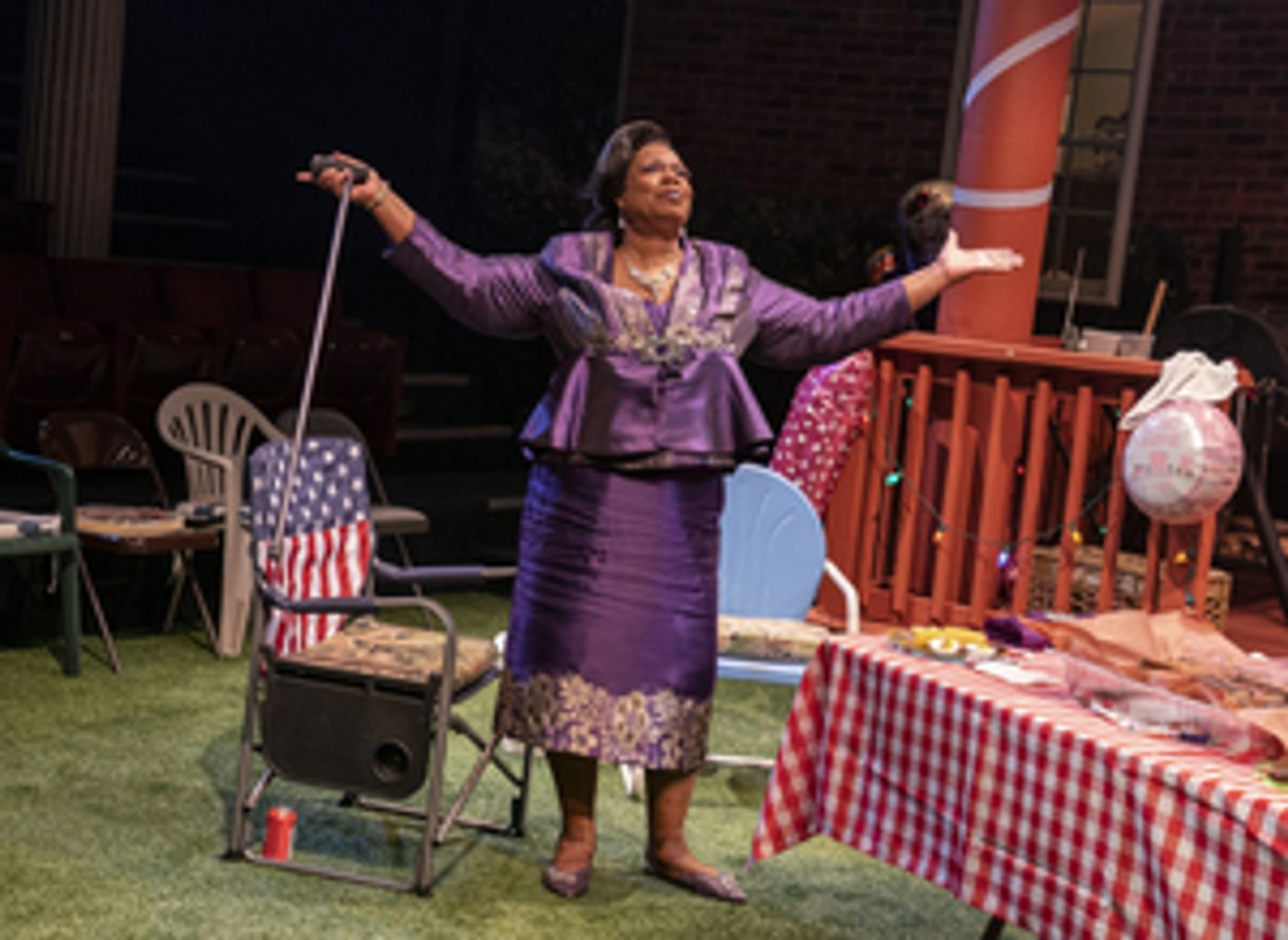Review Roundup: FAT HAM Opens at The Public Theater
James Ijames' Fat Ham is the 2022 winner of the Pulitzer Prize for Drama.

The Public Theater and National Black Theatre present the 2022 Pulitzer Prize-Winning Play Fat Ham, opening tonight! Read the reviews below!
Earlier today it was announced that the production has extended again now through Sunday, July 3rd at The Public Theater.
Critically-acclaimed playwright James Ijames reinvents Shakespeare's masterpiece with his new drama, FAT HAM. Juicy is a queer, Southern college kid, already grappling with some serious questions of identity, when the ghost of his father shows up in their backyard, demanding that Juicy avenge his murder. It feels like a familiar story to Juicy, well-versed in Hamlet's woes. What's different is Juicy himself, a sensitive and self-aware young Black man trying to break the cycles of trauma and violence in service of his own liberation. From an uproarious family barbecue emerges a compelling examination of love and loss, pain and joy. FAT HAM is a delectable comic tragedy directed by The Public's Associate Artistic Director Saheem Ali.
The complete cast of FAT HAM includes Nikki Crawford (Tedra), RJ Foster (Rev/Papp Understudy) , Tanesha Gary (Tedra/Rabby Understudy), Marquis D. Gibson (Juicy/Larry/Tio Understudy), Chris Herbie Holland (Tio), Billy Eugene Jones (Rev/Pap), Alexandria Brienne Lewis (Opal Understudy), Adrianna Mitchell (Opal), Calvin Leon Smith (Larry), Marcel Spears (Juicy), Benja Kay Thomas (Rabby), and Matthew Elijah Webb (Juicy/Larry/Tio Understudy).
The production features scenic design by Maruti Evans, costume design by Dominique Fawn Hill, lighting design by Stacey Derosier, sound design by Mikaal Sulaiman, hair and wig design by Earon Nealey, prop management by Claire M. Kavanah, illusions design by Skylar Fox, fight direction by Lisa Kopitsky, and choreography by Darrell Moultrie. Jereme Kyle serves as the Production Stage Manager and Ryan Kane serves as the Stage Manager.
Maya Phillips, The New York Times: "Fat Ham" truly sings in the ensemble scenes, and Ali's direction crackles in the many instances when there are overlapping jokes, remarks and barbs. If the comedy's not in the script, then it's in the controlled chaos, because the cast is talented, though they shine best when the action of the 90-minute show picks up. The pacing in the first few scenes could slow so the beauty of the language and characters don't get lost in a monotonous tread. And the actors' mostly mic-less performance occasionally suffers from their attempts to both emote and project; the volume erases much of the tonal modulation and dialogue pauses.
Helen Shaw, Vulture: So much of Fat Ham depends on the explicit exchange of one genre for another - tragedy for comedy - that a great deal also relies on your interaction with its humor. That's why this particular production's middle section lost me: I couldn't feel its core transaction, that shift in weight from expected sorrow (we know where this story goes) to experienced joy (this story can go anywhere he wants it to go). I admire Ijames's theatrical invention, and I could see his play moving briskly past me, but for an hour or more, it seemed to be at a distance. Finally, though, it did sweep me up, and I felt as though I was stepping onto a trolley already in motion. Ijames and Ali create a magnificently silly farce-climax, followed by a sublimely glittery reality-breaking denouement. And between these two sequences came my favorite moment. After the peak of the action, when the characters realize that the rules of dramaturgy do not need to apply to them, they relinquish their strenuously noisy performances and just talk. They turn outwards, get ready to tell us what the play was about, and - hesitate.
Melissa Rose Bernardo, New York Stage Review: Ijames turns to Shakespeare for a few chunks of text, but the lines are used sparingly, surprisingly, and smartly (you won't hear "to be or not to be"). Fat Ham might be a descendant of Hamlet, but it's in every way Ijames' creation. It's not a spoiler to say Fat Ham-directed by Public Theater resident director Saheem Ali (Merry Wives)-doesn't end as Shakespeare prescribed: in a bloodbath. Refreshingly, Ijames chooses joy and glitter and love and light.
Jonathan Mandell, New York Theater: All along, the playwright has not been committed to the story of "Hamlet," but now he doesn't even seem committed to his own story. I suppose one could argue that he's commenting on the contrast between the artifice of theater and the reality of people's lives in the 21st century, especially Black people's lives - or, perhaps, on the white (theatergoing) gaze preferring their Negroes to be sorrowful. But the shifts feel too abrupt, and the whole enterprise too full of silly moments, for the playwright's ultimate choices to feel like anything more rigorous than his saying: OK, I've made my points; I don't know where to go from here; it's time to party.
David Cote, Observer: Once you get past the sitcommy outlines of the project, the uniqueness of Ijames's voice and his critique of genre becomes more apparent and pleasurable. He translates the domestic and political conflict of Hamlet to the modern South where he grew up. The resulting queer, Black, middle-class lens is inherently irreverent and a goof, but also liberating. We lose a few grand speeches, but in return, we get big laughs and a moral vision a bit more palatable than ole Shakes's "women are whores, old men are pathetic, and then you die."
- To read more reviews, click here!
- Discuss the show on the BroadwayWorld Forum
Reader Reviews
Powered by
|
Videos

